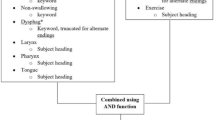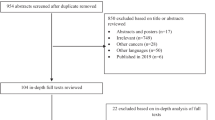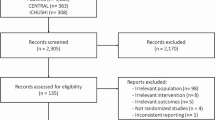Abstract
Objective
Patients who undergo a partial or total laryngectomy experience severe negative effects. The present study aimed to explore the impact of continuous nursing care via WeChat on patients undergoing partial or total laryngectomies.
Methods
A total of 86 patients who underwent partial or total laryngectomies were enrolled in this study and divided into two groups: an observation group and a control group. The observation group received continuous nursing via WeChat, while the control group received routine nursing care. Psychological status, degree of cancer fatigue, and changes in quality of life before and after intervention were compared using a satisfaction questionnaire, self-rating depression scale (SDS), self-rating anxiety scale (SAS), piper fatigue scale (PFS), and the quality-of-life questionnaire of the European Organisation for Cancer Therapy and Research.
Results
The total satisfaction rate of the observation group (95.35%) was higher than that of the control group (74.42%) (P < 0.05). After intervention, the SDS, SAS, and cognitive, sensory, emotional, and behavioral scores of both groups were lower than before intervention (P < 0.05), with those of the observation group being lower than those of the control group (P < 0.05). The quality-of-life scores after intervention were higher in both groups than before intervention (P < 0.05), with those of the observation group being higher than those of the control group (P < 0.05).
Conclusion
Continuous nursing via WeChat has a significant effect on patients who have undergone a partial or total laryngectomy, and it can improve a patient’s psychological status, alleviate cancer fatigue, and improve quality of life.
Similar content being viewed by others
Data availability
All data generated or analysed during this study are included in this article. Further enquiries can be directed to the corresponding author.
Notes
WeChat is a free chat software with no charge.
Abbreviations
- SDS:
-
Self-rating depression scale
- SAS:
-
Self-rating anxiety scale
- PFS:
-
Piper fatigue scale
References
Dong C, Li L, Huang Z (2019) Application of near-total laryngectomy in patients with advanced laryngeal cancer. J Pract Clin Med 23(6):113–115
Guo W, Sun L, Wang B et al (2018) Research progress on quality of life and nursing intervention strategies of laryngeal cancer patients after surgery. Int J Nurs 37(22):3165–3168
Huang G, Wei L, Lan N et al (2018) The effect of continuity nursing of WeChat on the quality of life of patients with laryngeal cancer after surgery. Jilin Med Sci 39(1):179–182
Lei D, Pan X (2019) Treatment options for advanced laryngeal cancer. Chin J Otolaryngol Head Neck Surg 54(5):398–400
Li X (2019a) Concept, connotation and implementation strategy of precision surgery for laryngeal cancer treatment. Chin J Otolaryngol Head Neck Surg 54(5):325–329
Li H (2019b) Effect evaluation of radical surgery combined with radiotherapy and chemotherapy for laryngeal cancer patients. J Pract Clin Med 23(22):37–39
Li C, Wang C (2019) The effect of family-centered nursing intervention on the short-term and long-term efficacy of postoperative chemotherapy for laryngeal cancer. Modern Oncol Med 27(21):3793–3797
Lu S, Qi H, Zhao D et al (2018) Effects of partial laryngectomy for laryngeal cancer on quality of life and prognosis. Guizhou Med 42(11):1313–1314
Tan S, Li H, Luo J et al (2006) Evaluation of the quality of life questionnaire in the 3rd edition of the core questionnaire for quality of life developed by the European organization for research and treatment of cancer. China Clin Rehabil 10(4):23–26
Tong Q, Shen Z, Ying Y et al (2018) Long-term efficacy and influencing factors of surgical treatment for laryngeal cancer patients. Zhejiang Med College 40(23):2521–2524
Wang Y, Li J, Pan Y (2019) Analysis of postoperative infection status of patients with early laryngeal cancer and Countermeasures for nursing intervention. Nurs Pract Res 16(2):12–14
Xu H, Cheng S, Huang Y et al (2017) Effect of continuous nursing intervention on psychological status of laryngeal cancer patients after surgery. Nurs Pract Res 14(11):75–77
Xu X, Deng W, Huang C et al (2019a) Efficacy comparison of endoscopic plasma ablation and open surgery for early laryngeal cancer. J Otolaryngol Eye Shandong Univ 33(2):81–85
Xu X, Sun N, Nie P (2019b) Effect of continuous nursing based on APP platform on treatment compliance and quality of life of patients discharged after laryngeal cancer surgery. Chin Cancer Clin Rehabil 26(9):1140–1143
Yang X (2018) Effect of combined intervention of self-efficacy and self-care on postoperative laryngeal function reconstruction and social function of patients with laryngeal cancer. Sichuan Med College 39(8):964–967
Yang B, Enico M (2013) Head and Neck Oncology and Surgical Repair. Tianjin Publishing Media Group: 199, 201, 278, 380, 393
Yao H, Wan W (2019) Application effect analysis of peer support education in continuous care of patients after total laryngectomy. J Otolaryngol Eye Shandong Univ 33(3):138–142
Ye X, Wang L, Li L et al (2018) Observation of intervention effect of cluster nursing on postoperative cancer-related fatigue in patients with laryngeal cancer. Zhejiang Med College 40(5):513–515
Yu X, Li Y (2019) Effect of continuous nursing on quality of life and psychological status of laryngeal cancer patients after surgery. Genom Appl Biol 38(9):4282–4287
Yu Z, Ding R, Han Y (2018) Evaluation of application effect of continuity nursing based on WeChat platform in rehabilitation of patients after Miles radical resection of rectal malignancy. China Digit Med 13(8):76–78
Zheng T (2018) Effect of continuous nursing on self-care ability of patients after total laryngectomy. Southwest Natl Def Med 28(1):76–78
Zheng Y, Yan B, Cai Y et al (2019) Efficacy and safety analysis of low temperature plasma knife and partial laryngectomy for early glottic laryngeal cancer? Tumor Prev Treat 32(8):730–735
Acknowledgements
We would like to acknowledge the hard and dedicated work of all the staff that implemented the intervention and evaluation components of the study.
Funding
No external funding received to conduct this study.
Author information
Authors and Affiliations
Contributions
Conception and design of the research: YL. Acquisition of data: YL. Analysis and interpretation of the data: YL. Statistical analysis: YL. Writing of the manuscript: YL. Critical revision of the manuscript for intellectual content: YL.
Corresponding author
Ethics declarations
Conflict of interest
The authors declare that they have no conflicts of interests.
Ethical approval
This study was conducted with approval from the Ethics Committee of Capital Medical University Affiliated Beijing Shijitan Hospital. This study was conducted in accordance with the declaration of Helsinki. Written informed consent was obtained from all participants.
Additional information
Publisher's Note
Springer Nature remains neutral with regard to jurisdictional claims in published maps and institutional affiliations.
Rights and permissions
Springer Nature or its licensor (e.g. a society or other partner) holds exclusive rights to this article under a publishing agreement with the author(s) or other rightsholder(s); author self-archiving of the accepted manuscript version of this article is solely governed by the terms of such publishing agreement and applicable law.
About this article
Cite this article
Yin, L. Clinical study on the influence of continuous nursing via WeChat on patients undergoing partial or total laryngectomy. J Cancer Res Clin Oncol 149, 13043–13049 (2023). https://doi.org/10.1007/s00432-023-05036-y
Received:
Accepted:
Published:
Issue Date:
DOI: https://doi.org/10.1007/s00432-023-05036-y




